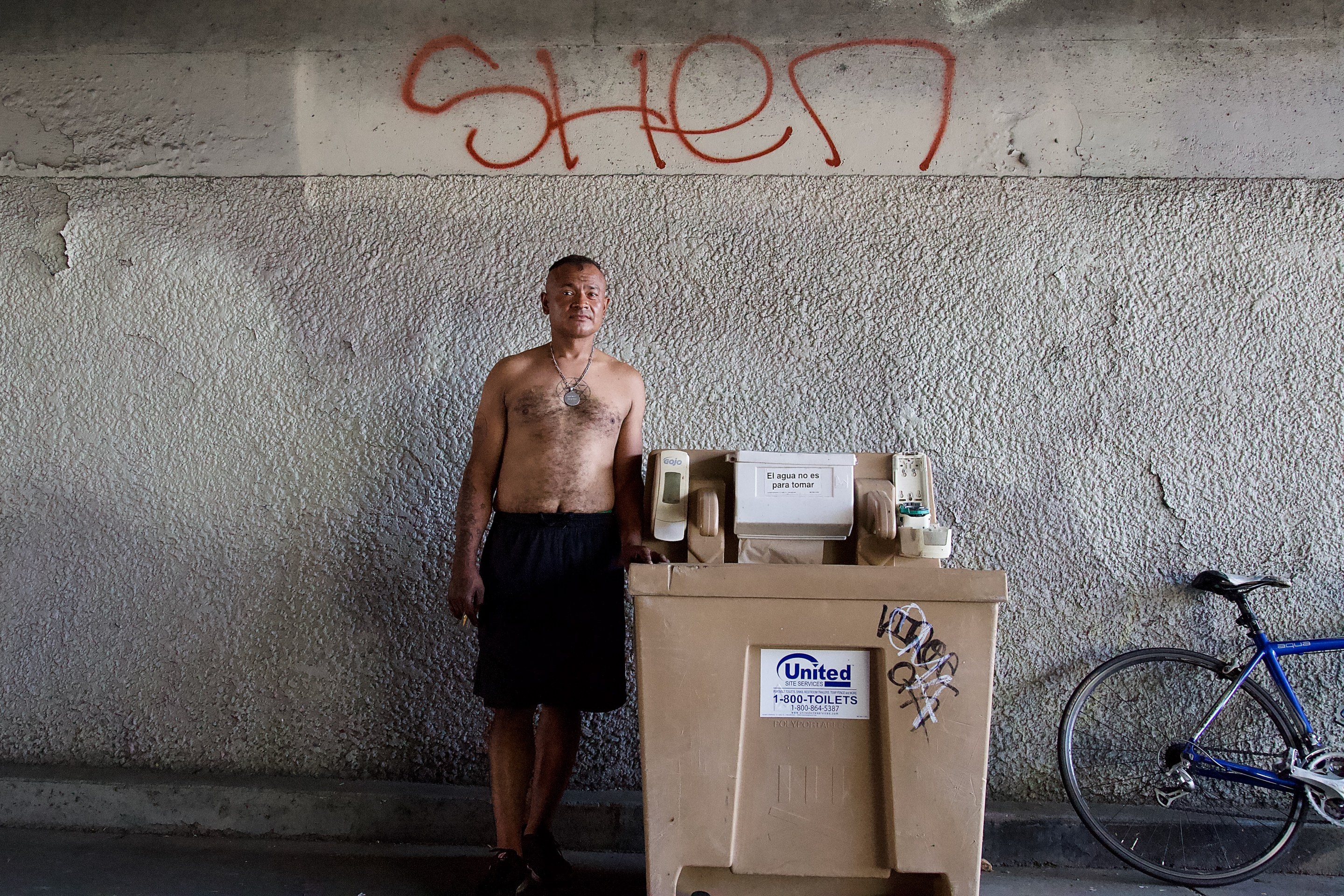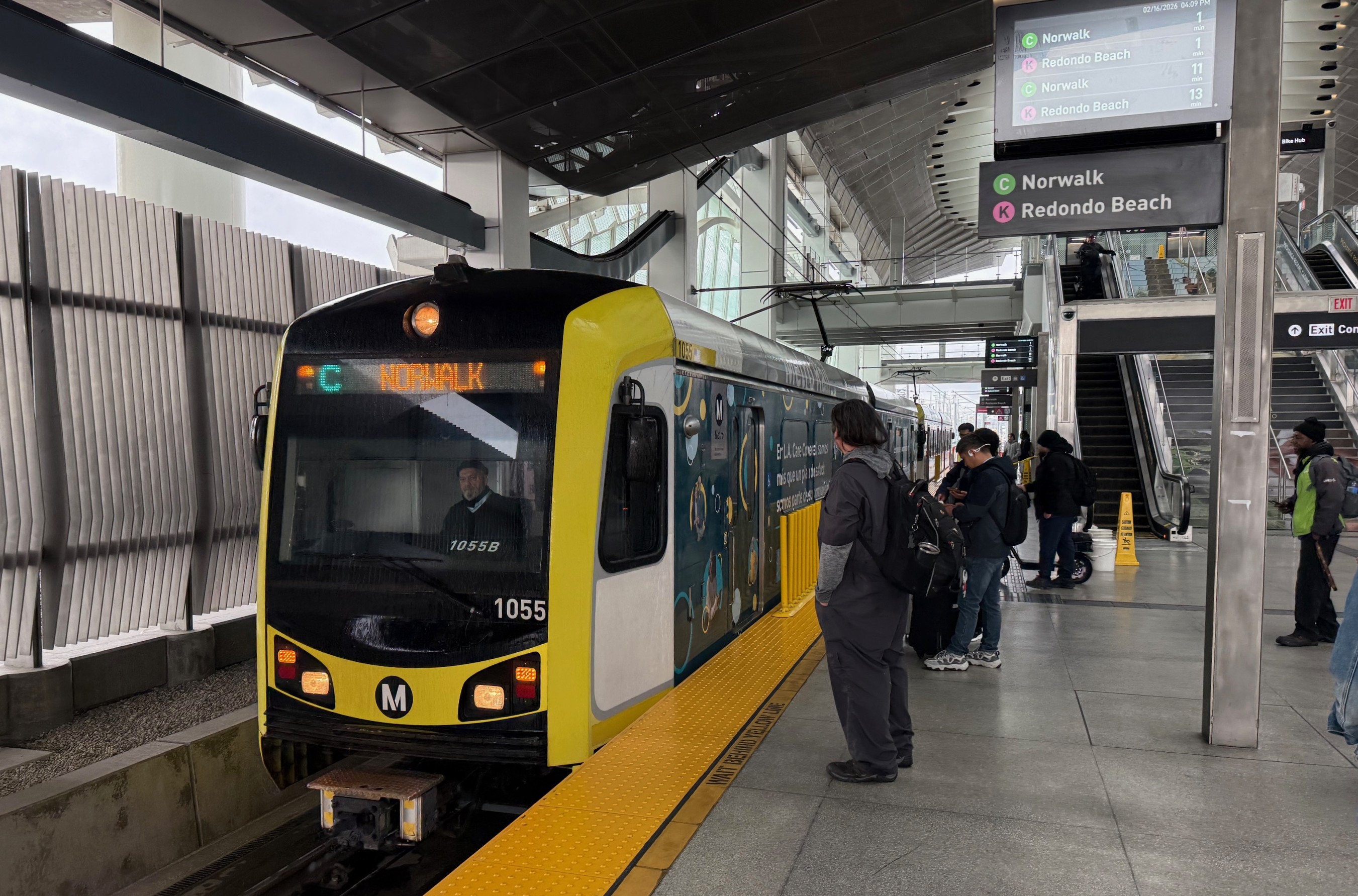A few feet down from where the handwashing station lies on its side, El Abuelo Travieso - a name that translates to the Naughty Grandfather (though he told me with a giggle that it translates to Grandpa Tush) - is spraying his arms and hands down with a liquid from a disinfectant bottle.
He had tried to set the station back up on its feet, he says. But it had proven a little too heavy for a man who was nearly 60 and a few inches shy of five feet tall.
The station and the nearby port-a-potty had arrived well over a month ago, he says, and it was regularly refilled with water (though soap appeared to be lacking). He appreciated the amenities, even if the toilet paper was long gone, he says. He is, however, somewhat annoyed that it took a pandemic for the city to see the wisdom of helping the unhoused stay clean and healthy. After all, he says with an exaggerated shrug, isn't one of the biggest complaints about homeless people that they go to the bathroom in the streets?
It was that guy that just came through here, right? says a disgusted Miguel Ángel in Spanish as he jogs up to help me stand the sink back up.
Yes, says Grandpa T.
According to the men, a young man who regularly harasses the unhoused residents of the 110 freeway underpass at Venice Blvd., had come through and tipped the station over, spilling its remaining water out. He's always doing something to frighten people and make them feel less secure in the streets, they say.
They know him to be troubled and assume he's on drugs - meth dealers work the corner just up the street, they say. And while he is not the only one that messes with them and steals their things, he's been the worst and most frequent of the offenders of late.
The nights have become a lot noisier now that there are more people on the streets and more people struggling with all kinds of mental health issues, says Grandpa T. Having to wonder when the bandit would strike next was adding to his stress.
Grandpa T. has been on the streets for about three years. At least that's what they tell me, he says in Spanish. He found himself out without a place to go when his family lost their housing. They swear to him it happened three years ago. But if you ask me, he says, it was only a year, a year and a half ago. I don't have any memory of that first year I was out here.
He doesn't mind life on the streets - he sees it as an adventure. He says he has lived more in the last year than he did in the 50-plus preceding it. He does what he wants and still gets ladies almost every night, he assures me with a toothy grin, a wink, and a shoulder shimmy. And he manages to collect enough money from recycling that he can buy food that he enjoys cooking for himself. He is not sure he would be willing to move into supportive housing, he says. There's too many hoops he feels he would have to jump through, and he doesn't like the idea of having to live with other people, especially because he likely wouldn't have a choice about who he lived with. But he's eagerly waiting on a hotel voucher he says he was promised - he wouldn't mind having a roof over his head if it meant he could just mind his own business. Especially if this young guy was going to come around and keep harassing them.
I'd like to see this bandit get some help so he will leave everyone alone, Miguel Ángel says of their tormentor.
As someone who's been on the streets for fifteen years, Miguel Ángel has usually been able to find ways to push back at people who mess with him. But this guy has proven elusive, forcing Miguel Ángel to park the truck he sleeps in under some of the surveillance cameras on Venice.
Like Grandpa T., he just wants to be left alone. He is a working man - he's been employed most of the decade-plus he's been unhoused. But because he was a few hundred dollars short when trying to get his immigration papers in order several years back, he apparently never was able to rectify his status. So he has often been kicked out of housing or fired without notice, he says, including being fired from his job wrapping fish orders just three days ago.
Having documents would go a long way to making my life easier, he says. But he is also satisfied with how he handles his situation. He reads, takes care of himself and those around him, and tries to remain plugged into society enough to keep his mind healthy.
If you don't talk to others, he says, looking in Grandpa T.'s direction - Grandpa T. had headed west on Venice after giving us a sly grin and another shimmy, you'll start talking to yourself. He'd seen enough of that to feel like it would signal he was in real trouble.
As for the handwashing station, he says, giving it a thump, he wishes they would just lock it to something. The first station that had been dropped off there was smaller but locked down, and they hadn't had any problems with it, he says. If no one was going to stop the bandit, the least the authorities could do was make it harder for troublemakers to mess with the first real amenities the residents had been given.







